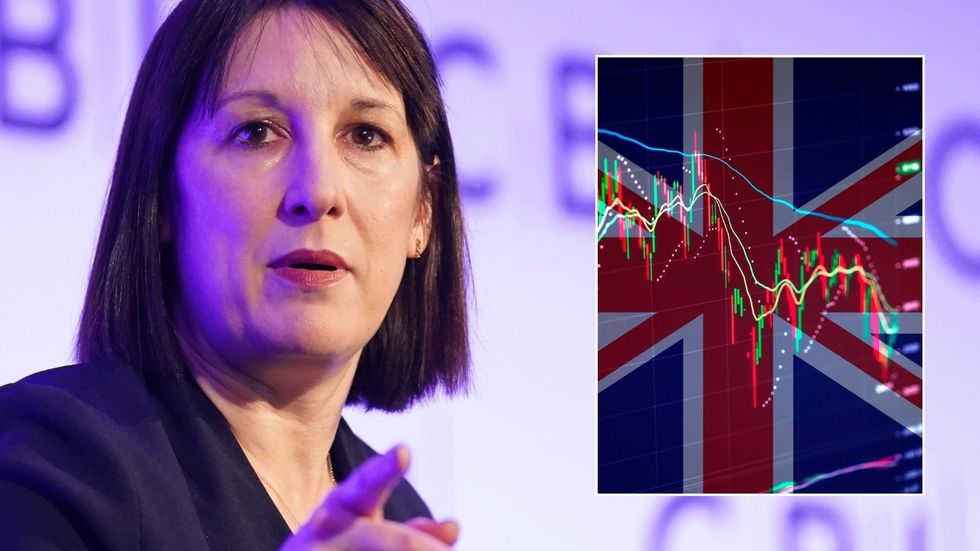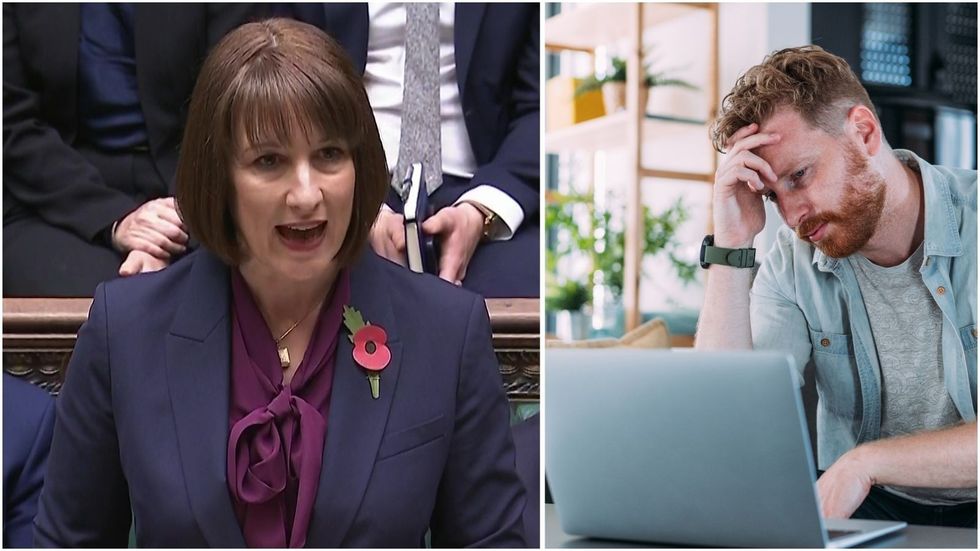Sarah Louise Robertson rips into Rachel Reeves over the farmer tax
GB NEWS
UK Government borrowing continues to 'surge' which is likely to place additional pressure on Chancellor Rachel Reeves
Don't Miss
Most Read
Trending on GB News
The UK's long-term Government borrowing costs have surged to their highest level since 1998, dealing a potentially significant blow to Chancellor Rachel Reeves's fiscal plans.
The yield on 30-year gilts climbed to 5.22 per cent on Tuesday, surpassing last year's peak and intensifying pressure on the Treasury. The sharp increase threatens to squeeze the Government's headroom for public spending as interest costs rise.
This surge in borrowing costs comes as the Treasury faces mounting challenges from a fresh wave of bond sales and growing investor concerns about stagflation risks.
Stagflation is the term used to describe when an economy experiences a extended period slow growth, high unemployment, and rising prices. Following the Covid pandemic, taxpayers have been forced to contend with high inflation, interest rates and energy bills.
Market expectations that UK interest rates will decrease more slowly than previously anticipated have contributed to keeping rates elevated. The UK's Debt Management Office conducted a sale of £2.25billion in 30-year notes on Tuesday, with a yield of 5.19 per cent.
Do you have a money story you’d like to share? Get in touch by emailing money@gbnews.uk.

"Bad news" for Rachel Reeves's economy plans, according to the latest borrowing figures
GETTY / PA
The increase of four basis points in gilt yields reflects growing market concerns about Government finances. A further £4.25billion of notes are scheduled for sale on Wednesday, adding to the pressure on borrowing costs.
Furthermore, the Bank of England is set to reduce its balance sheet through the sale of securities as part of its quantitative tightening process next week. The DMO has projected total note sales of approximately £296.9billion for the 2024-25 fiscal year.
The global bond market has experienced a broader sell-off in recent months, partly driven by concerns over potential Trump tariff policies and their inflationary impact on international economies.
Richard Carter, head of fixed interest at Quilter Cheviot, warned that the surge in gilt yields is raising concerns about public finances. "Gilt yields have surged sharply in recent weeks, which is bad news for the Government as it stokes fears about the state of public finances," he said.
Carter attributed part of the spike to Donald Trump's victory in the US presidential election. "His policies on tax and immigration are expected to drive inflation, leading to rising yields in the US and, consequently, in the UK as well," he explained.
Ahead of the 2024 Presidential Election, Trump pledged to implement sweeping tariffs upon entering office, which is a tax on goods and services from other countries.
The market uncertainty is particularly acute as Trump's inauguration approaches, he noted. The Bank of England's cautious stance on interest rate cuts has further contributed to market volatility.
Despite the market turbulence, Carter suggested that gilt yields still offer attractive opportunities for investors. "Despite this turbulence, gilt yields still present an attractive opportunity for long-term investors," he said.
He noted that current yields are exceeding expected inflation levels, making them viable for investors seeking returns in a sluggish economy. For more risk-averse investors, Carter recommended short-dated gilts as a promising option.
"For investors with a lower risk appetite, short-dated gilts still offer a promising avenue and are less sensitive to market fluctuations," he added. However, the reiterated that outlook remains particularly uncertain as markets await potential policy changes under the incoming Trump administration.
LATEST DEVELOPMENTS:
 Thousands of businesses have signed a letter asking Rachel Reeves to reconsider the inheritance tax changes
GETTY/GBNEWS
Thousands of businesses have signed a letter asking Rachel Reeves to reconsider the inheritance tax changes
GETTY/GBNEWS
Last year, Rachel Reeves outlined various policy changes as part of her Autumn Budget and other fiscal statements. Among the most controversial moves were raising National Insurance contributions on employers, making pensions liable for inheritance tax (IHT) and means-testing Winter Fuel Payments.
These tax raising policies are being implemented to plug the £22billion "black hole" in the public finances cited by the Chancellor soon after Labour returned to power following the General Election last year.
Toby Tallon, a tax partner at professional services group Evelyn Partners, said: "Rachel Reeves actively courted the business community well in advance of the election.
"However, since the election business owners have been on a rollercoaster of uncertainty in the run-up to the Budget with an array of tax rises suggested by or leaked to the press. They are today feeling the pain given the significant changes confirmed to IHT and employers’ NIC contributions."








